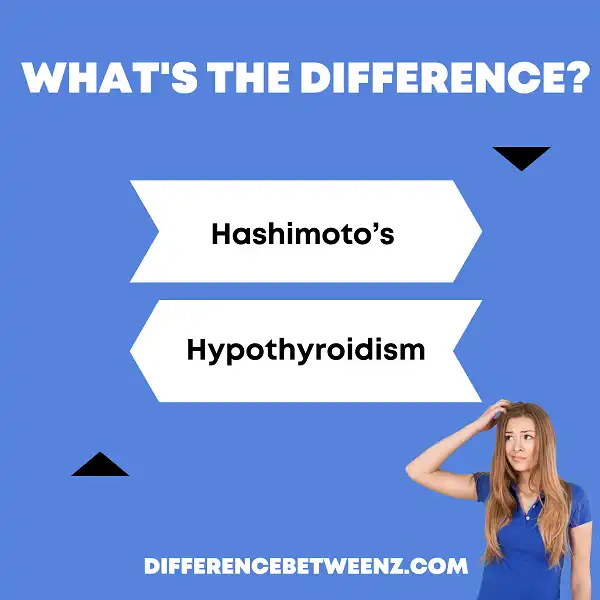Hashimoto’s disease and hypothyroidism are both conditions that affect the thyroid gland, but they are not the same thing. Hashimoto’s is an autoimmune condition, while hypothyroidism is a result of low thyroid hormone levels. Each condition has its own set of symptoms and treatment options. If you are experiencing symptoms that could be indicative of either condition, it is important to see a doctor for diagnosis and treatment.
What is Hashimoto’s?
Hashimoto’s is an autoimmune disease that affects the thyroid gland. The thyroid is a small, butterfly-shaped gland located in the front of the neck just below Adam’s apple. It produces hormones that regulate metabolism, which is the process by which the body converts food into energy. In Hashimoto’s, the immune system mistakenly attacks the thyroid and destroys or damages it. As a result, the thyroid produces fewer hormones, leading to a condition known as hypothyroidism.
Hashimotos is the most common cause of hypothyroidism in the United States. It is estimated to affect up to 10 million Americans, and it is more common in women than in men. Hashimoto’s can occur at any age, but it is most commonly diagnosed in middle-aged women. There is no cure for Hashimoto’s, but it can be managed with medication.
What is Hypothyroidism?
Hypothyroidism is a medical condition in which the thyroid gland does not produce enough thyroid hormone. This hormone is responsible for regulating metabolism, and when levels are too low, it can result in a wide range of symptoms, including fatigue, weight gain, dry skin, and constipation.
In severe cases, hypothyroidism can lead to myxedema coma, a potentially fatal condition characterized by fluid retention and low body temperature. While hypothyroidism can develop at any age, it is most common in women over the age of 60. Treatment for hypothyroidism typically involves taking synthetic thyroid hormone to replace the missing hormone. In most cases, this is an effective treatment, and patients are able to lead normal, healthy lives.
Difference between Hashimoto’s and Hypothyroidism
Hashimoto’s disease and hypothyroidism are both conditions that can cause problems with the thyroid gland.
- Hashimoto’s disease is an autoimmune disorder, which means that the body’s immune system mistakenly attacks the thyroid gland. This can lead to inflammation of the thyroid gland and a decrease in the production of thyroid hormones.
- Hypothyroidism, on the other hand, is a condition in which the thyroid gland does not produce enough thyroid hormones. This can be caused by a number of different things, including Hashimoto’s disease, medications, radiation therapy, or surgery.
- Both conditions can cause symptoms such as tiredness, weight gain, hair loss, and dry skin. However, Hashimoto’s disease is typically more difficult to treat than hypothyroidism.
In most cases, treatment for Hashimoto’s disease will involve taking medication to suppress the immune system and i/v therapies to replace missing thyroid hormones. Hypothyroidism, on the other hand, can often be treated with oral medication to replace missing thyroid hormones.
Conclusion
Hashimoto’s and Hypothyroidism are both conditions that affect the thyroid, but they are not the same. Hashimoto’s is an autoimmune disease where the body attacks its own thyroid gland. Hypothyroidism is a condition where the thyroid does not produce enough hormones. Both of these conditions can cause symptoms like weight gain, fatigue, and hair loss.
Hashimoto’s is more common than hypothyroidism, and it can be difficult to diagnose because many of its symptoms are also associated with other diseases. Hypothyroidism can be treated with medication, while there is no cure for Hashimoto’s.


